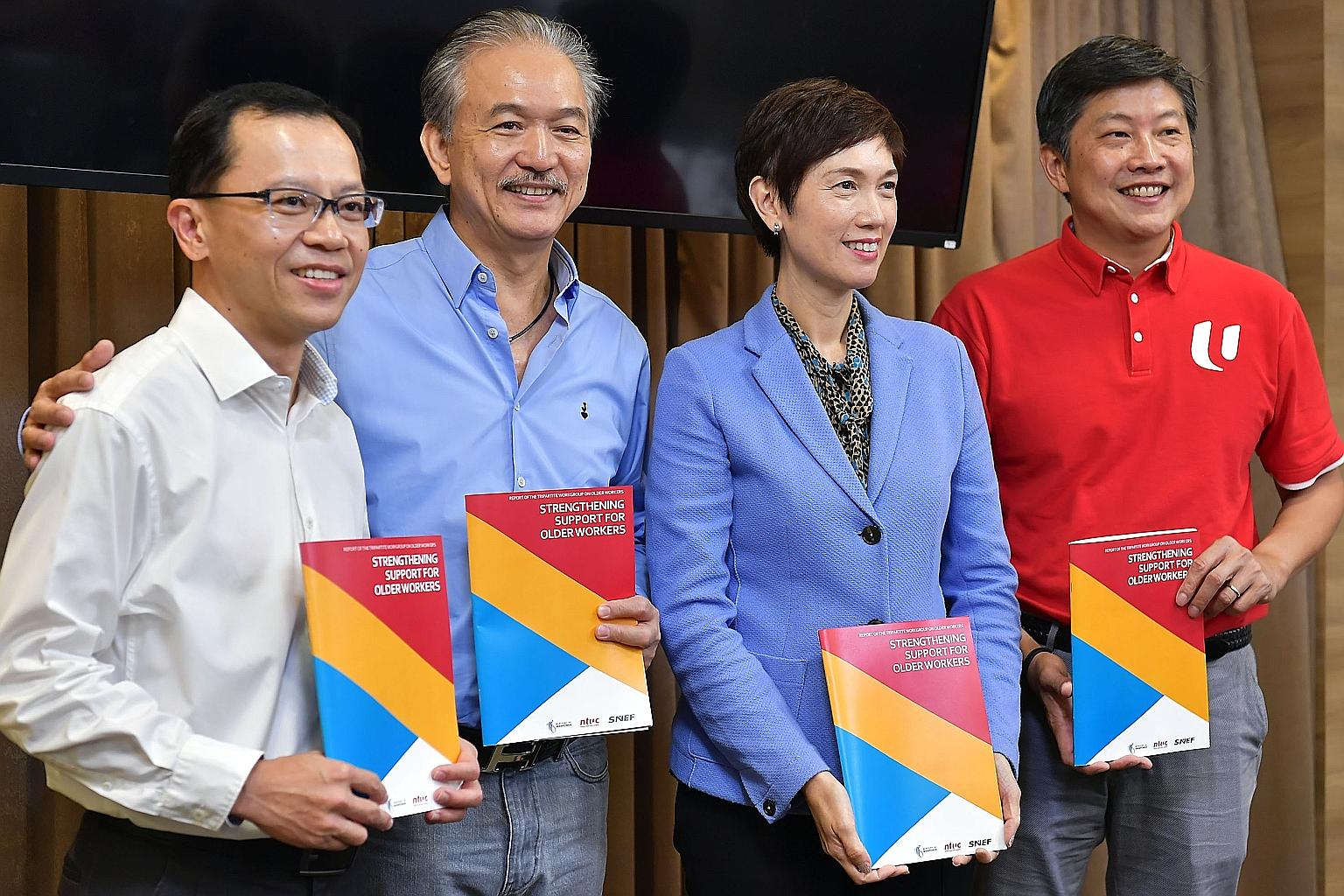Group sought to meet workers' interests while mindful of costs
Sign up now: Get ST's newsletters delivered to your inbox

(From left) Permanent Secretary for Manpower and Tripartite Workgroup on Older Workers chairman Aubeck Kam; Singapore National Employers Federation president Robert Yap; Manpower Minister Josephine Teo; and National Trades Union Congress secretary-general and Minister in the Prime Minister's Office Ng Chee Meng with copies of the workgroup's report at a news conference last Saturday. The workgroup's 22 recommendations were accepted by the Government.
ST PHOTO: NG SOR LUAN
When the high-level workgroup looking at issues concerning older workers went to the Netherlands for a study trip in January this year, they sat down to discuss the timeframe for the changes they were proposing.
Though they were planning to come to a conclusion before dinner, the meeting ended up stretching through a dinner of cookies until about midnight, labour chief Ng Chee Meng said.
The workgroup of government, employer and union representatives, which was formed in May last year, "had quite a few interesting involved arguments" as it sought to meet workers' interests while ensuring that costs for businesses are kept reasonable, said Mr Ng, who is an adviser to the group.
Fellow adviser Robert Yap, who is president of the Singapore National Employers Federation (SNEF), said that although the discussions were "rough and tough", eventually the concerns of each tripartite party were addressed.
At a news conference last Saturday, members of the Tripartite Workgroup on Older Workers and its secretariat spoke about the considerations that went into the set of 22 recommendations they eventually produced.
For example, National Trades Union Congress (NTUC) assistant secretary-general Cham Hui Fong said the labour movement consulted workers extensively about the possible impact of higher Central Provident Fund (CPF) contribution rates on their disposable incomes. It found that even those in the relatively lower-income group, earning $2,000 to $3,000, saw the benefits of such a move in improving their retirement adequacy.
"But of course the responsibility that we have and they themselves have is how do they continue to upkeep themselves, and with the hope that companies will still do well and be able to warrant a minimum 1 per cent to 2 per cent (wage) increase," said Ms Cham.
The workgroup also initially considered arguments for abolishing the Retirement and Re-employment Act, but decided against that as the law assures workers of employment until the re-employment age, though they are free to stop working if they want to. Also, countries without a statutory retirement age equivalent, such as Australia and Denmark, do not have better employment outcomes for older workers than Singapore.
The group proposed a three-year increase in retirement and re-employment ages as the health-adjusted life expectancy at age 62 has gone up by more than three years since the retirement age was last raised in 1999.
As for the timeline for the key changes - raising the ages and CPF contribution rates - the group said that as the CPF rate increases have a direct impact on wage costs and take-home pay, the timeline to reach the full increase could be stretched beyond 2030 if economic conditions are poor.
At the same time, Mr Ng, who is NTUC secretary-general and Minister in the Prime Minister's Office, said that if economic conditions improve, the labour movement may request to shift the timeline earlier, "so that the workers' interests are taken care of ahead of what is planned".
Permanent Secretary for Manpower Aubeck Kam, who chairs the workgroup, said that among other countries the workgroup visited which also have plans to raise their retirement ages, none was envisaging anything more ambitious than the kind of pace Singapore will take.
Workgroup member Goh Swee Chen, SNEF's former vice-president, said that from a social aspect, helping workers stay employed for longer enables them to continue contributing to society, while from a business perspective, "you can only prosper if there is stability, cohesion and inclusion in society".
"So, rather than thinking about age as a problem, from a business perspective, it is really a benefit that we could extend a very precious resource here in Singapore for a longer period," she said.


